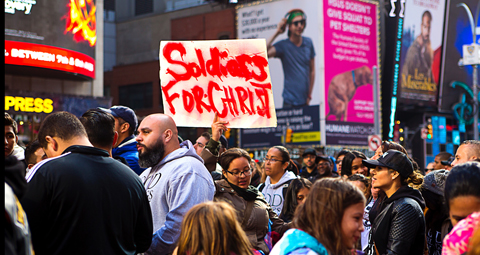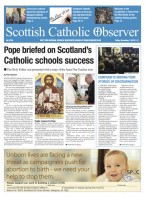BY Ian Dunn | July 21 2017 | ![]() 0 COMMENTS
0 COMMENTS ![]() print
print

A third of Scots think Jesus was an ‘extremist,’ poll finds
Publication Date: 2017-07-21
The survey has provoked fears that Christians could be caught up in plans to tackle extremism By Ian Dunn
There are growing fears that Christians could be caught up in the UK government’s plans to crack down on ‘non-violent extremism’ after a poll found that nearly a third of people said Jesus Christ was an ‘extremist.’
The poll carried out by ComRes for the Evangelical Alliance in conjunction with a coalition of Christian organisations also found that nearly half of the people interviewed believed that it was extremism to define marriage as a union between a man and a woman only.
The survey comes just weeks after the government’s announcement of a Commission for Countering Extremism to combat hardline Islamist ideology and ‘to support the government in stamping out extremist ideology in all its forms.’
Christian Churches have serious concerns about the strategy given the subjective and changing nature of how extremism can be defined.
Confusion
A spokesman for the Catholic Church in Scotland said the poll suggested people were confused over the definition of extremism.
“This poll appears to reveal a degree of confusion amongst respondents about the meaning of the term ‘extreme.’
“The problem with the terms ‘extremist’ or ‘extremism,’ as we understand them today, is that they have often become closely associated with violence,” he said. “While not advocating violence, Christ did call for radical changes in the way society organises itself.
“Christianity, while challenging, could only be considered extremist in a society where aggressive secularist conformity had become the norm. Hopefully Scotland is a long way from such a situation.”
The poll of 2,004 people found that 28 per cent of respondents considered Jesus Christ to be an extremist in both Scotland and the UK as a whole.
13 per cent thought that the Dalai Lama could be considered an extremist, 20 per cent said Gandhi could be considered an extremist while 25 per cent thought that Martin Luther King and Nelson Mandela could be considered extremists. Eight per cent of those surveyed also said that Cambodian dictator Pol Pot, who was responsible for the deaths of millions, was not an extremist.
A total of 41 per cent of those polled said that people who believed in traditional marriage were extremists.
The poll also found that 48 per cent of people did not think the abolition of the monarchy was extreme, while the same proportion said it was not extreme to give animals the same rights as human beings.
Chaos and division
David Landrum, director of advocacy for the Evangelical Alliance, said: “The language of extremism is a recipe for chaos and division.
“The government has failed to define extremism, and the public is clearly divided about which ideas are extremist. It therefore seems unlikely that a newly-established quango, such as an extremism commission, will solve such problems.
“It is not wise to foster a society where volatile public opinion can be used to determine what might be extreme or acceptable views.”
In last month’s Queen’s Speech, in which the government’s proposed laws for the coming year are revealed, Queen Elizabeth II announced: “A commission for countering extremism will be established to support the government in stamping out extremist ideology in all its forms, both across society and on the internet, so it is denied a safe space to spread.”
PIC: JD Mason











